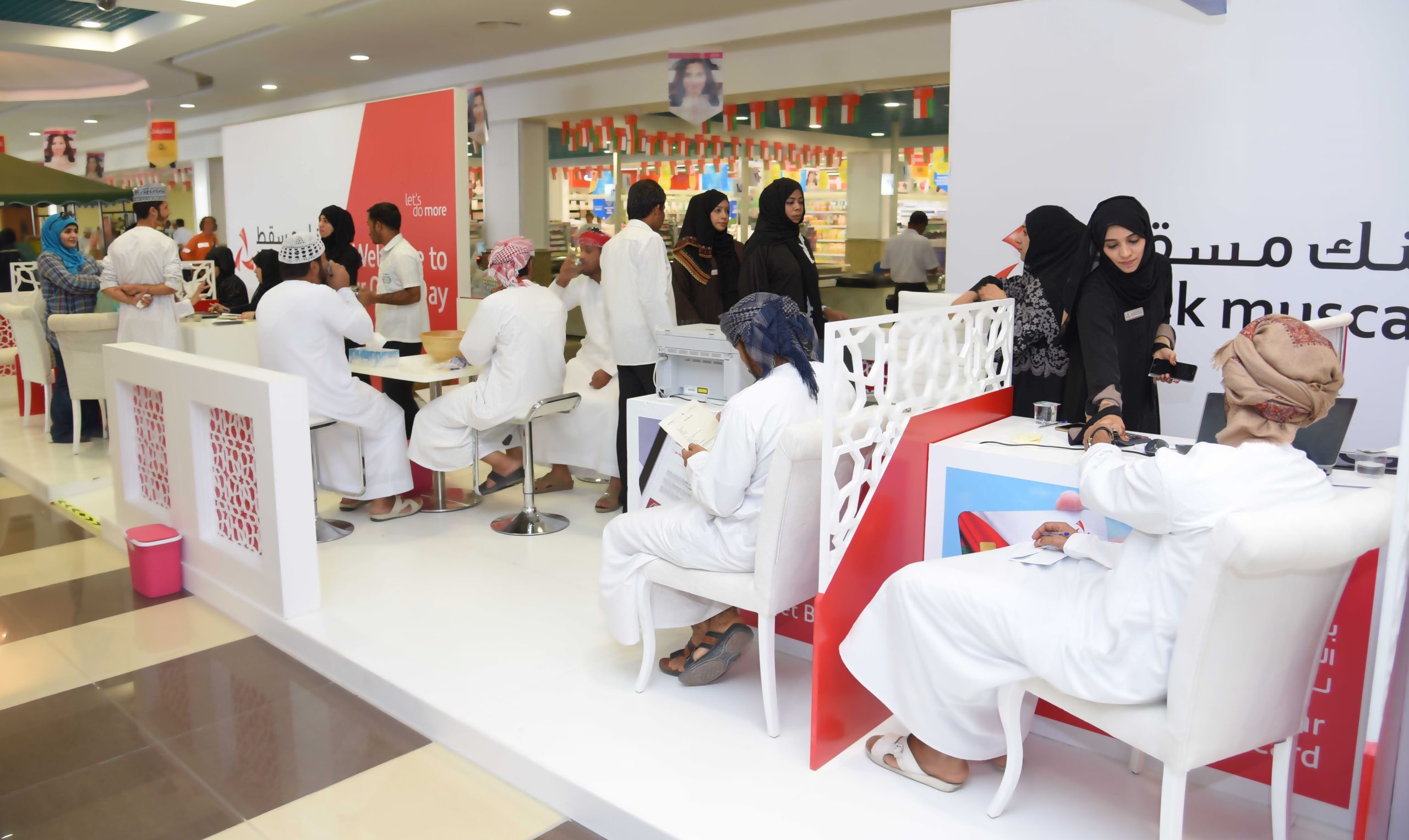Banking & Finance
PRUDENCE PAYS
Rashad Ali Al Musafir, Acting CEO, Bank Sohar talks about balancing retail and corporate lending and how this stands it in good stead.

Rashad Ali Al Musafir, Acting CEO, Bank Sohar talks about balancing retail and corporate lending and how this stands it in good stead.
Financial performance in 2014
The year 2014 carried various challenges, both internally and externally. From a regulatory perspective, the Central Bank of Oman (CBO) came up with a number of new regulations that impacted the business of banks in Oman. For example, a new ceiling was introduced restricting the overseas exposures of banks. This has resulted in a reduction in our overseas interbank placement book by almost 50 per cent. The CBO also implemented the Basel III norms, which raise the capital adequacy requirements of banks. The cost of compliance to various local and international laws and regulations continued to pose additional challenges and continues to put pressure on banks from a business and cost perspective.
From a macro economic view, the slide in oil prices in the last quarter of the year 2014 had resulted in a steep decline in the value of various investments, including the local Muscat Securities Market and other local and international investments. This was a direct result of a decline in the investor sentiment and their expectations of a negative impact on the oil-dependent economies from such decline in oil prices. Furthermore, the banking sector continued to witness high level of competition on assets from conventional and Islamic banks, pushing asset yields downwards. Internally, we had to deal with various other challenges in 2014, as our head of risk sadly passed away in the early part of the year. We also had a relatively higher level of staff turnover in senior management positions during the year. As a result, there was some reshuffling of people and restructuring of functions within the bank. These posed some operational challenges within the organisation.
Despite these challenges, the bank had performed well with net profits increasing by 11per cent, loan book increasing by 14 per cent and deposit base growing by 11 per cent. From a business division perspective, our corporate loan book grew by 13 per cent, while the retail book grew by 17 per cent. The growth in our deposit base reflects the confidence of the customers in the bank. Our saving deposits grew by 16 per cent, even though we only have 26 branches, significantly less than our competitors. Overall, our results have been very positive for our shareholders.
Retail Banking
Bank Sohar has sufficient room to grow its personal lending, as the personal loan ratio is below the 30 per cent level, far below the regulatory cap of 40 per cent. The CBO statistics and public information available on other banks reflect that most banks are close to the CBO cap of 40 per cent or already above that level. The key challenge is to either bring down the retail component of their portfolio, either by growing their corporate book, or to shrink the size of their retail lending book. As shrinking the book takes time, most banks opt to go aggressively after corporate loans, and hence put additional pressure on corporate asset yields and impact margins. Bank Sohar has always been maintaining a conservative personal loan ratio, keeping it below 30 per cent. The retail business is unlike the corporate business, as retail yields are capped by regulations and are long term in nature. The cost of funds for such long term loans is high, so growing the retail component aggressively in the current economic environment is not a prudent approach. Moreover, retail loans cannot be repriced easily, as one cannot go back to a customer after two to three years and increase the interest rate on his loan. This is on account of the debt service ratio limitations as well as the negative message this will send out to our customers. Today, interest rates are low, and if oil prices continue to remain at current levels for the remaining part of this year, the expectations are that liquidity will begin to tighten, and interest rates will start moving upwards.
Corporate loans
Our corporate loans have grown by 13 per cent, which is a good rate of growth given the high level of competition for corporate assets. The interest rate risk on the corporate assets is not like the retail, since the majority of corporate assets are reviewed on an annual basis and rates are negotiated based on market conditions. As the interest rate risk is relatively less, we can afford to be more competitive on the corporate side, in line with the market conditions. But as most banks are growing their corporate books aggressively to meet the personal loan (retail) requirements, there is a lot of competition in this field and to top it there are Islamic windows and Islamic banks that are looking for avenues to grow their books. This competition is driving the asset yields and various related fees down. But despite such challenges we grew at a healthy rate.
Islamic banking
Bank Sohar has always been conservative when it comes to Islamic banking. When the CBO allowed Islamic banking we saw every bank in Oman starting an Islamic window and there were two new Islamic banks. We knew that there is going to be severe competition in this area. We have opened our Islamic window with the objective of providing the required sharia-compliant product and service to our clients. So it was more of a defensive strategy to provide a solution for our customers. If the customer wants to take a sharia-compliant product it is available with us. Our capital for Islamic finance is maintained at the minimum level required by CBO, which is RO10mn, as we do not plan to expand this portfolio aggressively. The Islamic banking market is relatively new to Oman, and less competitive when compared to the conventional side. The public awareness on the product features, as well as the lack of relative operational efficiency resulting from additional process and documentation requirements keep the Islamic banking products at a disadvantage to the conventional products. This is reflected in the limited growth rates in the Islamic banking assets in the banking industry. There was a pull back by the customers as they realised that the profits charged by Islamic banks and interest rates charged by commercial banks are fairly similar, with Islamic banks documentations, turn-around times and process requirements are more challenging.
Promoting SMEs
The SME portfolio has not grown as expected, as there are a number of challenges that banks face on this front. We appreciate and support the government’s drive to promote SMEs and there are a lot of initiatives put in place by banks to support this goal. At Bank Sohar, we have our SME division headed by a fairly senior executive members. We have also introduced a direct sales team, so that we can approach customers and get their business instead of waiting for them to come to us. The challenge in growing this business is identifying the assets that carry the right levels of risk. Oman’s experience in the SME space was not very good in the past, with high levels of NPAs booked by banks when they went aggressive in this area. The key gap we see is the lack of business acumen and financial discipline on the customer side. Customers running small business mix business and personal funds. Apart from financial discipline and capability, knowledge of customers on how to financially manage their small business is also limited. We regularly see customers requiring long term funding for their business, but insist that they are given short term funding products. Banks need to support the SMEs by providing a lot more financial advisory, hand holding, consulting and advising them on the right financing structures suitable for their business needs. Customers need to trust the banks on this, and accept the same for the benefit of their business.
There is a drive by the regulators to support SMEs and this is a very honourable objective. The success of this will benefit the larger economy as it will create jobs and business opportunities. The CBO wants banks to allocate at least five per cent of their loan book to SMEs. The CBO also does not want banks to insist on security while lending to SMEs, but at the same time, banks have to manage the risks of the portfolio. We need to strike a balance between lending to SMEs and the risk to our shareholders. We are eventually responsible for protecting depositors’ money – which is another key objective of the Central Bank of Oman. This is a very fine balance that we need to strike. Yes, five per cent is a very challenging target and over the years we have communicated this to the CBO, but the Central Bank takes SME lending very seriously and we are trying to grow this book to the extent possible.
-

 Alamaliktistaad Magazines2 months ago
Alamaliktistaad Magazines2 months agoAl-iktisaad, November 24
-

 Oman2 months ago
Oman2 months agoShell Oman Partners with Oneroad Automotive Gives Away 2 Forthing Cars as Part of its ‘Win Big’ Campaign
-

 Energy1 month ago
Energy1 month agoOman and Belgium Strengthen Green Hydrogen Partnership with New Landmark Agreement
-

 Energy1 month ago
Energy1 month agoOUTLOOK: Emerging Markets and Renewables – The Twin Engines of Energy Growth for 2025
-

 Technology1 month ago
Technology1 month agoEXCLUSIVE: Technological Singularity – Will It Become Humanity’s Greatest Leap or Its Most Perilous Step?
-

 OER Magazines1 month ago
OER Magazines1 month agoOER Magazine: December 2024 Edition – The Most Trusted Brands in Oman
-

 Oman1 month ago
Oman1 month agoOman Braces for Launch of First Experimental Rocket Duqm-1 on 4 December 2024
-

 Oman1 month ago
Oman1 month agoTransport Ministry Issues New Regulation for Security of Ships, Ports































You must be logged in to post a comment Login